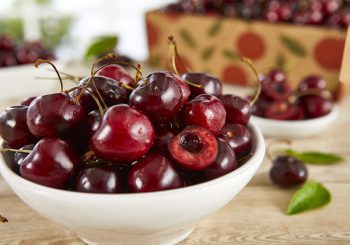By Sayer Ji
Contributing writer for Wake Up World
They satisfy a sweet tooth and are likely more sought-after than their tart counterparts. Sweet cherries, however, offer more than just taste and freshness.
Like the tart variety, sweet cherry is often used in dried, powder and juice forms, making for a flexible addition to a wealth of recipes. Cherries can also be eaten raw as a snack, added to fruit salads, turned into compote for breakfast bowls and puddings, or incorporated frozen into smoothies and blended drinks.
[pro_ad_display_adzone id=”110028″]
This valued seasonal fruit, scientifically known as Prunus avium L., also provides a bevy of health benefits.
1. Fights Inflammation
Sweet cherries, like their cousin sour cherries, contain high levels of antioxidants, specifically anthocyanins that support antioxidant activity and quercetin that helps regulate blood pressure.[i]
Their high antioxidant content is thought to help fight oxidative stress, which has been linked to chronic disease and premature aging.[ii] Cherries are particularly abundant in polyphenols, a family of plant chemicals that combat cellular damage and slash inflammation in the body.[iii]
In a 2006 study, Bing sweet cherries appeared to reduce inflammation in healthy subjects.[iv] Anthocyanins in cherry and mulberry, too, were found in separate research to alleviate oxidative stress and inflammation associated with obesity in animal models.[v]
2. Protects the Brain
Rich in compounds called phenolics, cherries may have anti-neurodegenerative properties.[vi] “Overall results showed that cherries are rich in phenolics, especially in anthocyanins, with a strong anti-neurodegenerative activity and that they can serve as a good source of biofunctional phytochemicals in our diet,” wrote the researchers of a 2005 study.
Cherries, specifically the tart kind, previously been found to significantly reduce age-associated inflammation and promote protein or cellular homeostasis in the hippocampus, as well as improve working memory.[vii] They are therefore considered helpful in promoting healthy brain aging and delaying neurodegenerative disorders.
3. Aids in Exercise Recovery
Cherries aid in active recovery after exercise because they are a reliable source of natural sugar. A carbohydrate-rich post-workout food such as cherries may help refuel glycogen stores as well as promote muscle repair.[viii]
Reported to be high in anti-inflammatory and antioxidative capacity, cherries and their components are thought to provide a similar but natural alternative to over-the-counter non-steroidal anti-inflammatory drugs (NSAIDs) or analgesics.[ix]
Connected to inflammation and oxidative stress as stress responses to exercise, evidence points to trends of decreased circulating C-reactive protein, a common inflammation marker, in healthy women after two servings, or 280 g each, of Bing sweet cherries.[x]
On a related note, in a study involving 20 active women, those who drank tart cherry juice twice daily for eight days recovered more quickly and experienced less muscle damage and soreness after their sprint exercises versus the placebo group.[xi]
4. Improves Skin
Sweet cherries are a wonderful source of vitamin C and polyphenols, which both hold the key to healthy, youthful skin.
Vitamin C protects the skin from oxidative stress by donating electrons to neutralize free radicals.[xii] It is also essential in the synthesis of collagen.
Deemed “most dramatic and reproducible” of all of vitamin C’s effects on skin health is wound healing, directly linked to collagen synthesis.[xiii] “[This] means that supplementation is useful, and both topical application and increased nutrient intake have been shown to be beneficial,” wrote the authors of a 2017 study.
5. Fights Metabolic Disease
A 2019 study concluded that metabolic disorders were counteracted by consuming the fruit and leaves of sweet cherries.[xiv] The findings may help prevent and treat obesity-related metabolic disorders, such as cardiovascular disease.
In other research, five varieties of sweet cherries from Portugal’s Fundão region were found to contain bioactive compounds that may help prevent diabetes, heart disease and cancer, to name a few.[xv] In the study, the sweet cherry varieties had antidiabetic potential and an ability to protect human erythrocytes from oxidative damage.
6. Helps Combat Arthritis and Gout
Their anti-inflammatory action enables sweet cherries to ease the painful symptoms of arthritis, particularly gout, characterized by a buildup of uric acid and marked by joint inflammation, swelling and pain.
A study involving 10 women found that two servings of the fruit (280 grams) following an overnight fast reduced levels of C-reactive protein and substantially decreased uric acid levels post-intake.[xvi]
Anthocyanin extracts from sweet cherries as well as raspberries also demonstrated anti-inflammatory activity comparable to ibuprofen and naproxen, both common drug strategies against arthritis.[xvii]
7. Promotes Restful Sleep
Sweet cherries are a natural source of melatonin, an antioxidant that is widely linked to sleep regulation.[xviii]
Studies highlighted sweet and tart cherries’ ability to improve both quality and quantity of sleep, with the effect easily detected within three days of consuming sweet cherries in 141-gram quantities (about 25 pieces). Those who consumed the fruit also reported reduced urinary cortisol and anxiety along with improved mood.
Look deeper into the types and benefits of cherries through scientific studies on the GreenMedInfo.com database.
References:
[i] Butu M et al “Fruit and Vegetable-Based Beverages–Nutritional Properties and Health Benefits” Natural Beverages. 2019: 303-38.
[ii] Liguori I et al “Oxidative stress, aging, and diseases” Clin Interv Aging. 2018; 13: 757-772. Epub 2018 Apr 26.
[iii] Ferretti G et al “Cherry Antioxidants: From Farm to Table” Molecules. 2010 Oct; 15(10): 6993-7005. Epub 2010 Oct 12.
[iv] Kelley D et al “Consumption of Bing sweet cherries lowers circulating concentrations of inflammation markers in healthy men and women” J Nutr. 2006 Apr;136(4):981-6.
[v] Wu t et al “Mulberry and cherry anthocyanin consumption prevents oxidative stress and inflammation in diet-induced obese mice” Mol Nutr Food Res. 2015 Dec 2. Epub 2015 Dec 2.
[vi] Kim D et al “Sweet and sour cherry phenolics and their protective effects on neuronal cells” J Agric Food Chem. 2005 Dec 28;53(26):9921-7.
[vii] Thangthaeng N et al “Tart cherry supplementation improves working memory, hippocampal inflammation, and autophagy in aged rats” Age (Dordr). 2016 Dec; 38(5-6): 393-404. Epub 2016 Aug 30.
[viii] Poole C et al “The role of post-exercise nutrient administration on muscle protein synthesis and glycogen synthesis” J Sports Sci Med. 2010 Sep 1;9(3):354-63.
[ix] Bell P et al “The role of cherries in exercise and health” Scand J Med Sci Sports. 2013
[x] Bell P et al “The role of cherries in exercise and health” Scand J Med Sci Sports. 2013
[xi] Brown M et al “Montmorency tart cherry (Prunus cerasus L.) supplementation accelerates recovery from exercise-induced muscle damage in females” Eur J Sport Sci. 2019 Feb;19(1):95-102.
[xii] Telang P “Vitamin C in dermatology” Indian Dermatol Online J. 2013 Apr-Jun; 4(2): 143-146.
[xiii] Pullar J et al “The Roles of Vitamin C in Skin Health” Nutrients. 2017 Aug; 9(8): 866. Epub 2017 Aug 12.
[xiv] Dziadek K et al “High-Fructose Diet-Induced Metabolic Disorders Were Counteracted by the Intake of Fruit and Leaves of Sweet Cherry in Wistar Rats” Nutrients. 2019 Nov 3 ;11(11). Epub 2019 Nov 3.
[xv] Gonçalves A et al “Sweet cherries from Fundão possess antidiabetic potential and protect human erythrocytes against oxidative damage” Food Res Int. 2017 May ;95:91-100. Epub 2017 Feb 28.
[xvi] Jacob R et al “Consumption of cherries lowers plasma urate in healthy women” J Nutr. 2003 Jun;133(6):1826-9.
[xvii] Seeram N et al “Cyclooxygenase inhibitory and antioxidant cyanidin glycosides in cherries and berries” Phytomedicine. 2001 Sep;8(5):362-9.
[xviii] Kelley D et al “A Review of the Health Benefits of Cherries” Nutrients. 2018 Mar; 10(3): 368. Epub 2018 Mar 17.
Recommended Articles by Sayer Ji:
- The Power and Mystery of Melanin Explained
- Cell Phone Induced Bodily Harm: How the Bees Can Help
- The Spice That Prevents Fluoride Destroying Your Brain
- How to Clean Your Arteries with One Simple Fruit
- 7 Healing Uses for Lavender Essential Oil
- From Table to Tomb: Cumin’s Health Benefits Rediscovered
- Why You Should Ditch Sugar in Favour of Honey
- The Love Affair Between Saffron and Humanity: As Ancient as Time Itself
- Why Walnut Resembles the Brain It Nourishes
- Magnesium Puts Psychiatric Drugs to Shame for Depression
About the author:
Sayer Ji is the founder of Greenmedinfo.com, a reviewer at the International Journal of Human Nutrition and Functional Medicine, Co-founder and CEO of Systome Biomed, Vice Chairman of the Board of the National Health Federation, and Steering Committee Member of the Global Non-GMO Foundation.
© 2020 GreenMedInfo LLC. This work is reproduced and distributed with the permission of GreenMedInfo LLC. Want to learn more from GreenMedInfo? Sign up for their newsletter here.
[pro_ad_display_adzone id=”110027″]









